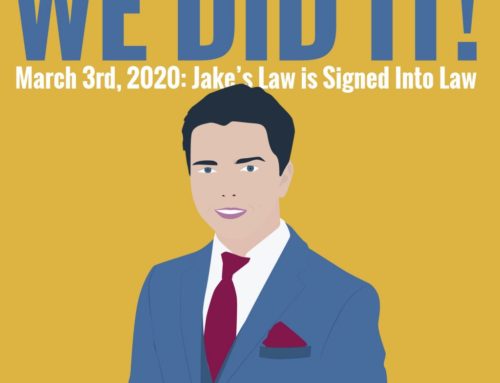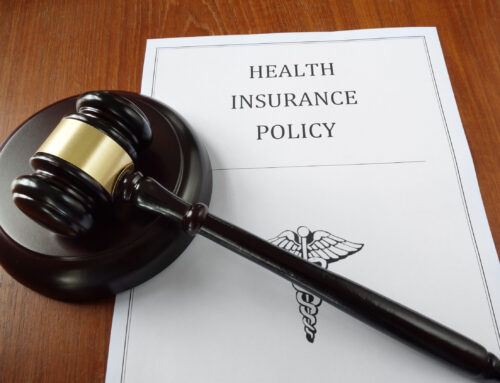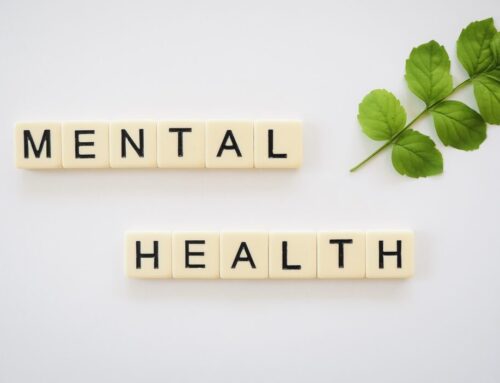SB 1523 and HB2764 | “Jake’s Law”

Jake
A MULTI-FACETED APPROACH TO COMBATTING SUICIDE AND SUBSTANCE USE THROUGH INSURANCE TRANSPARENCY, INCREASED YOUTH ACCESS TO MENTAL HEALTHCARE, AND INFORMING FUTURE PUBLIC POLICY WITH NEW SOURCES OF DATA
Suicide is a public health concern reaching epidemic proportions across the United States and in Arizona. In 2018, we lost 1,532 Arizonans to drug overdoses and 1,432 to suicide. Tragically, suicide is increasingly impacting children. According to the latest Arizona Child Fatality Review Report, child suicide increased 32% from 2016-2017, with 68% of those deaths occurring in children 15-17 years of age. “Jake’s Law” endeavors to begin addressing this problem and is the result of extensive stakeholder input from insurers, suicide prevention and mental health advocacy organizations, providers, hospitals, and concerned citizens.
“JAKE’S LAW”:
- Requires insurance cards issued in Arizona to clearly identify which governmental agency to contact for questions or to file complaints.
- Requires insurers to file a comparative analysis report with the Department of Insurance every three years or whenever there is a substantive change in a health plan, demonstrating their compliance with federal parity laws.
- Requires the Department of Insurance to establish a consumer-friendly webpage containing resources pertaining to mental health parity, a step-by-step guide on how to file parity violation complaints, and a summary regarding insurers’ compliance with mental health parity laws.
- Prohibits an insurer from denying a claim for mental health or substance use benefits based solely on the grounds that the service was provided in an educational setting or was court-ordered.
- Establishes a Mental Health Parity Advisory Committee to provide the Director of the Department of Insurance advice on case management, discharge planning, and expedited review and appeals processes for cases involving suicidal ideation.
- Establishes and appropriates $100,000 for a Suicide Mortality Review Team within the Department of Health Services.
- Expands access to behavioral health services in schools by establishing a fund to help students covered by private insurance but who are unable to afford their copay or deductible.
- Requires and appropriates $300,000 to the Department of Education to conduct a study to determine the adequacy of behavioral health services offered in schools.
- Requires the Department of Health Services (DHS) to establish rules for discharge protocols for patients admitted for suicidal ideation or a suicide attempt, including information on crisis services, referrals, insurance appeals processes, and suicide risk assessments.
“JAKE’S LAW” INCREASES ACCESS TO TREATMENT BY ENSURING COMPLIANCE WITH MENTAL HEALTH & ADDICTION INSURANCE PARITY LAWS
Federal law already requires that insurers treat mental health the same as physical health, and “Jake’s Law” would ensure compliance with those laws by requiring insurers to submit a comprehensive comparative analysis to the Department of Insurance.
President George W. Bush signed the Mental Health Parity and Addiction Equity Act into law on October 3, 2008. Parity as a concept is very simple: insurance coverage for illnesses of the brain – like depression, anxiety, and addiction – should be no more restrictive than insurance coverage for any other medical condition. With only 40.3% of Arizonans living with mental illness receiving treatment and 41% of patients who are receiving behavioral health treatment going out-of-network, we know that access to care is a critical issue that must be addressed.
Unfortunately, insurers are struggling with some of the more complicated components of the federal law. Many of these trouble spots relate to how insurers design and apply their managed care practices, such as prior authorization requirements, medical necessity standards, and requirements for providers to join an insurer’s network.
States have primary enforcement authority over insurers that sell health insurance policies in their states. President Trump’s Opioid Commission recommended (pg. 72) that states use a standardized format to collect information from insurers that shows their compliance with the law as it relates to their managed care practices.
This legislation implements the recommendation of President Trump’s Opioid Commission and requires that insurers demonstrate compliance in terms of how they design and apply their managed care practices. Tennessee was the first state to codify this approach in 2018, and other states have followed suit.
“JAKE’S LAW” INCREASES YOUTH ACCESS TO MENTAL HEALTHCARE
Early intervention is critical to combatting suicide but, sadly, the average delay between the onset of symptoms and intervention is 8-10 years. This is far too long when 50% of lifetime cases of mental illness begin by age 14 and 75% by age 24. It is crucial that we increase youth access to mental healthcare to mitigate the rise in suicide but also to address issues that lead to higher school dropout rates and interactions with the juvenile justice system. 37% of students with mental health conditions drop out of school, and 70% of kids in our juvenile justice system have a mental health condition. “Jake’s Law” would increase youth access to mental healthcare by prohibiting insurers from denying mental health services solely because the service is provided on a school campus. “Jake’s Law” also expands behavioral health services in schools through a fund to help students covered by private insurance but who are unable to afford their copay or deductible. Students who are currently covered by AHCCCS are already benefitting from services provided in the convenience of the school setting. This helps parents who may not be able to take time away from work to ensure their children are receiving the appropriate level of mental healthcare. “Jake’s Law” will also require the Department of Education to conduct a study to determine the adequacy of behavioral health services offered in schools
“JAKE’S LAW” WILL INFORM FUTURE PUBLIC POLICY THROUGH NEW SOURCES OF DATA GENERATED BY A SUICIDE MORTALITY REVIEW TEAM
Identifying gaps in current suicide reporting is the first step toward understanding and beginning to solve the suicide crisis in Arizona. Currently, suicides are reported through hospital discharge data and death certificate data. This data can be delayed for up to 18 months, which does not allow for timely interventions and strategies to take effect. By identifying gaps in reporting and establishing a timelier reporting system, DHS can make better recommendations to prevent suicide in the future. In 2019, DHS took several steps to prepare for the creation of a Suicide Mortality Review Team, including developing a workgroup of medical examiners to standardize death certificate information, develop an online suicide dashboard, and develop and implement a statewide incident reporting system for lethal and non-lethal suicide attempts identified by State-licensed providers and facilities. By June 2020, DHS plans to map suicide and self-harm hotspots in Arizona and formally initiate the Team, which will be responsible for tracking suicide-related deaths, detecting gaps in reporting, and informing policy changes to address suicide in Arizona more effectively.
“JAKE’S LAW” IS SUPPORTED BY THE MEMBERS OF THE ARIZONA COALITION FOR INSURANCE PARITY
The Arizona Coalition for Insurance Parity is comprised of the JEM Foundation, Arizona Psychiatric Society, Mental Health America – AZ, MIKID, Arizona Council of Human Service Providers, American Psychiatric Association, and many concerned private citizens. Together, we are fighting for mental health equality by advocating for a state parity law that will establish much-needed transparency to ensure compliance with existing laws.





I’m so proud of you, Denise, for all of your hard work in making sure AZ’s youth doesn’t fall through the cracks in the system and are able to access the appropriate care in order to prevent further tragedies in the future.
Thank you so much for that. I appreciate you!